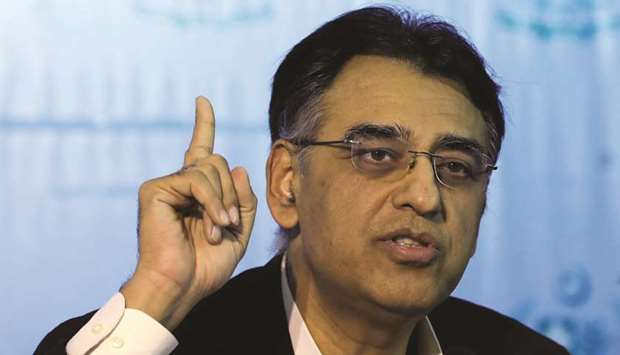As estimates of wealth stashed abroad by Pakistanis boiled down to just $5-7bn from a whopping $200bn, senior members of the ruling Pakistan Tehreek-e-Insaf (PTI) and the opposition Pakistan Peoples Party (PPP) accused each other of sheltering sugar mill owners suspected of manipulating prices, because of their influence over the top political leadership.
The politically hot issues came up for discussion at a meeting of the National Assembly’s Standing Committee on Finance, presided over by former finance minister Asad Umar.
Federal Board of Revenue (FBR) chairman Shabbar Zaidi and chief of international taxes Ashfaq Ahmad told the panel that Pakistan had received data from 41 countries about assets of Pakistanis abroad under agreements signed with Organisation for Economic Co-operation and Development (OECD) countries for automatic exchange of information.
Zaidi said that the government would be able to exchange such data with 80 countries by December 31 this year.
He said that the top 378 Pakistanis on the list had foreign assets worth $5bn – almost 78% of the total wealth.
Ashfaq explained that the cases involving $100,000 or above made up about 3.44% of the total number, but involved 94.37% of the reported account balance.
The total amount involved may be close to $7bn, the FBR chief said.
When Umar asked what action had been taken against the 378 “big fish” who appeared to have held about 80% of the total assets, the FBR representatives said that 115 such persons had availed of the tax amnesty last year and 72 this year, while 19 cases had been disposed of after creating a tax demand of Rs1.64bn, of which Rs888mn had been recovered.
The committee was informed that data about 1,980 persons had been received, and notices issued to 453 of them.
The relevant commissioners had been given a deadline of October 31 to complete investigations into the remaining 1,527 cases.
In all, data about assets and accounts of 152,000 wealthy Pakistanis had been received.
Asked how many of them had filed tax returns, the FBR team said the response could be made available soon because the last date for filing of returns had been extended to August 8.
Zaidi said that the information received under the OECD convention also had many limitations because of similar names, wrong addresses or so on, and formal requests were being made to partner countries to share full details.
He explained that full details from the UAE about Pakistanis’ assets were not available so far, but he is pushing the authorities to share information.
The PPP’s Nafisa Shah said that if the assets abroad were just $5-7bn, then the PTI’s all claims about $200bn assets of Pakistanis abroad were wrong, and she wondered how much of those funds had been brought to Pakistan as claimed by the party in power.
Umar then said the $200bn was not the PTI’s number but was reported by former finance minister Ishaq Dar in the National Assembly.
The panel was informed by the Competition Commission of Pakistan (CCP) that sugar prices had increased by over 26% (Rs15 per kg) over the past year, and that sugar mills had been found to have formed a cartel and practised collusive practices at three levels during a previous inquiry.
Asked by Umar if the CCP had also examined the allied earnings of the sugar industry, including ethanol and power sales, because these were the areas where the industry must have earned huge profits due to devaluation, its chairperson and members explained that allied earnings of the sugar industry were not looked into, but suggested that support price for sugarcane should not be based on weight but on sucrose content.
Umar then said there was apparently no reason for increase in the sugar price.
Nafisa Shah remarked that no action could be taken by the CCP against sugar mills for such collusive practices and price manipulation because top political leaderships were controlled by the ATMs (automated teller machines) of sugar mill owners, implying that those in authority had been paid off.
“This would never be investigated,” she added.
At this, Umar quipped that it was also evident from the fact that sugar mills were previously studied in 2009, and wondered why no action was taken for the next 10 years.
Shah said the “ATMs from sugar mills” were sitting on the right and left of the leadership of all political parties, including the current prime minister.
Umar said they had raised the issue of “ATMs” in his party, and it was after 10 years in the PTI government that the CCP was once again investigating the issue.
“We had also taken it up in the budget and also raised points of order,” he said, asking Shah to also raise a point of order on the issue and his party would support that.
Shah agreed to bring a point of order in the National Assembly, but wondered what action the CCP had taken against such manipulative practices.
Umar said former president Asif Ali Zardari also had many sugar mills and that the CCP should also report if notices had been issued to him or imposed any fine.
Shah claimed that Prime Minister Imran Khan is also being controlled “left and right by ATMs”, and wondered how many fines had been imposed on them (the lobbyists).

Umar: asked what action had been taken against the 378 ‘big fish’ who appeared to have held about 80% of the total assets of Pakistanis abroad.
